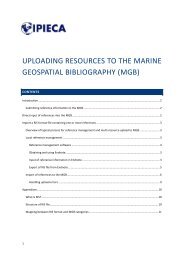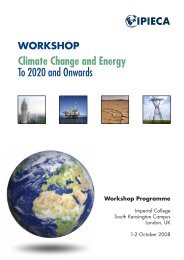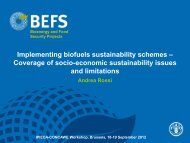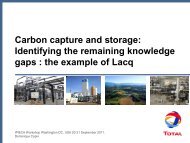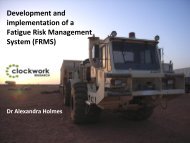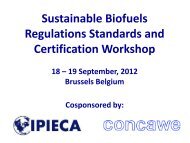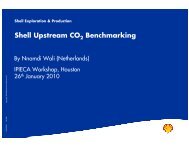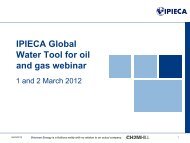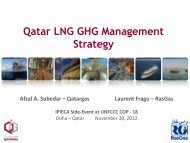WSSD Report FINAL! - OGP
WSSD Report FINAL! - OGP
WSSD Report FINAL! - OGP
Create successful ePaper yourself
Turn your PDF publications into a flip-book with our unique Google optimized e-Paper software.
CONTRIBUTING TO SUSTAINABLE DEVELOPMENT<br />
Ethics and human rights<br />
Promoting labour harmony<br />
Community partnership in Yemen<br />
At the signing of the<br />
ICEM Agreement,<br />
from left to right:<br />
Lars Anders Myhre<br />
(Norwegian Oil and<br />
Petrochemical<br />
Workers’ Union);<br />
Jostein Gaasemyr<br />
(Statoil); and Fred<br />
Higgs (ICEM)<br />
Statoil’s approach to labour relations is rooted in a<br />
Norwegian tradition that emphasizes dialogue<br />
and cooperation as the basis for relationships<br />
between employers and employees. This helps to<br />
engender a culture of trust within the company and<br />
encourages open channels of communication<br />
throughout the 21 countries in which Statoil operates.<br />
Within this vast geographical spread there are,<br />
however, great variations in terms of socio-economic<br />
development and degrees of political freedom.<br />
Consequently, the extent to which labour rights are<br />
respected also varies, meaning that Statoil’s challenges<br />
of upholding labour standards and developing good<br />
industrial relations differ from one country to another.<br />
Nevertheless, the promotion of cooperation<br />
between workers and management remains a part of<br />
Statoil’s basic approach to labour relations, helping to<br />
create a stable business environment and securing<br />
the company’s ‘licence to operate.’ Statoil’s agreement<br />
with the International Federation of Chemical,<br />
Energy, Mine and General Workers’ Unions (ICEM) was<br />
a significant and practical reinforcement of this philosophy,<br />
providing a global agreement for local<br />
improvement. The purpose of the agreement was: ‘To<br />
create an open channel of information between ICEM<br />
and Statoil management about industrial relations<br />
issues in order to continuously improve and develop<br />
good work practice in Statoil’s worldwide operations.’<br />
Signed in 1998, the Statoil/ICEM agreement was<br />
the first of its kind between a labour federation<br />
(whose members encompass 20 million workers in<br />
110 countries) and an individual<br />
company. To create a<br />
natural link between Statoil<br />
and ICEM, the Norwegian Oil<br />
and Petrochemical Workers’<br />
Union (NOPEF) acted as intermediary<br />
and signed the<br />
agreement on their own behalf.<br />
It was renewed in March 2001<br />
and adapted to the principles<br />
of the Global Compact.<br />
Nexen’s Yemenization programme is a partnership<br />
in which the government, community, stakeholders<br />
and the company can achieve mutual goals.<br />
Central to the programme is an intensive, threeyear<br />
English language and technical course that<br />
qualifies people for full-time employment in a<br />
number of fields. The numbers of Yemenis employed<br />
has increased at a steady pace—about nine per cent a<br />
year since Nexen began the programme in 1993,<br />
though no quota system is in operation. Instead, the<br />
programme was developed as an effective means to<br />
manage a sensitive issue.<br />
Currently 65 per cent of Nexen’s employees in<br />
Yemen are Yemeni. By 2009, the company hopes that<br />
figure will grow to 80 per cent.<br />
A scholarship programme will help to<br />
achieve that aspiration as promising<br />
Yemeni students receive post-secondary<br />
education in Canada, Nexen’s home<br />
country. Candidates are selected on their<br />
ability to succeed, combined with a commitment<br />
to bring the knowledge gained<br />
back to Yemen when their education is<br />
complete. The multi-tiered selection<br />
process is based primarily on objective<br />
criteria to ensure that the integrity of the<br />
process is maintained and only the most<br />
deserving students receive awards. In<br />
2000 Nexen doubled its commitment to<br />
40 scholarships.<br />
Promoting human rights in Azerbaijan<br />
Azerbaijan has one of the highest concentrations<br />
of refugees and internally displaced persons in<br />
the world—some 13.8 per cent of the population.<br />
There, a Statoil project, managed by the Norwegian<br />
Refugee Council, is working to contribute to peace<br />
building, reconciliation and democratization while<br />
promoting human rights through education.<br />
33




